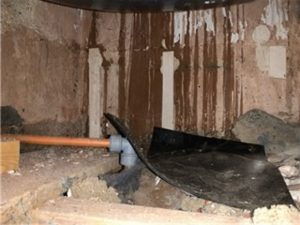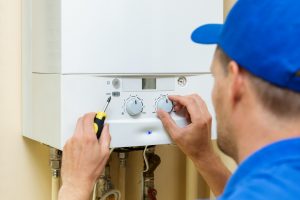Is Your Heating System Losing Pressure?
If so, then there may be a simple cause of this! You should have a small 15mm copper pipe that comes through the wall to the exterior of the property. This is called the pressure relief pipe. If this is dripping, then it is likely to be the cause of the pressure loss.
This can be caused by the expansion vessel within the boiler not holding its pressure and needs re-pressurising, or a replacement of the pressure relief valve. A plumbing / heating engineer will be required to repair these issues.
To check this, you need to make sure the heating is cold and hasn’t been in use for a few hours. If water is constantly coming from here, then the heat exchanger within the boiler has split / failed and will require replacing.
If none of the above are apparent, then the likelihood is that you have a leak.
Is Your Water Meter Spinning or Do You Have High Water Bills?
If you have had a high-water bill or your water meter is constantly spinning with nothing on within the house, then a few simple checks can be made and one of the following could be the cause. This could include:
- Overflowing loft tanks or toilets.
- Dripping taps / showers.
It is important that you make sure no taps or showers within the property are slightly running or dripping and no washing machines or dishwashers are in use and check meter again for movement.
Do You Have a Mould Problem?
Mould is very common within buildings and homes as it grows in places which retain a lot of moisture. This could be:
a)Leaks in the roof.
b)Windows.
c)Pipes
d)Where there has been flooding.
However, mould can grow on materials such as, paper products, cardboard, ceiling tiles as well as dust, paints, wallpaper, insulation, and dry wall. The most common type of mould which would be found indoors are Cladosporium, Penicillium and Aspergillus.
How do moulds get inside and how do they grow?
Moulds can be found indoors and outdoors and can enter your home simply through doorways and windows. But they can also attach themselves onto clothing and pets. Mould spores with often drop onto areas which have a high concentration of moisture.
How do you keep mould out of buildings and homes?
It is advised that if there is severe mould you have the building checked for water damage and make clearing of mould a part of routine building maintenance to prevent it from growing. However inside of homes you can control mould growth by:
- Controlling humidity levels.
- Promptly fixing leaky roofs, windows and pipes.
- Thoroughly cleaning and drying after flooding.
- Ventilating shower, laundry and cooking areas.



